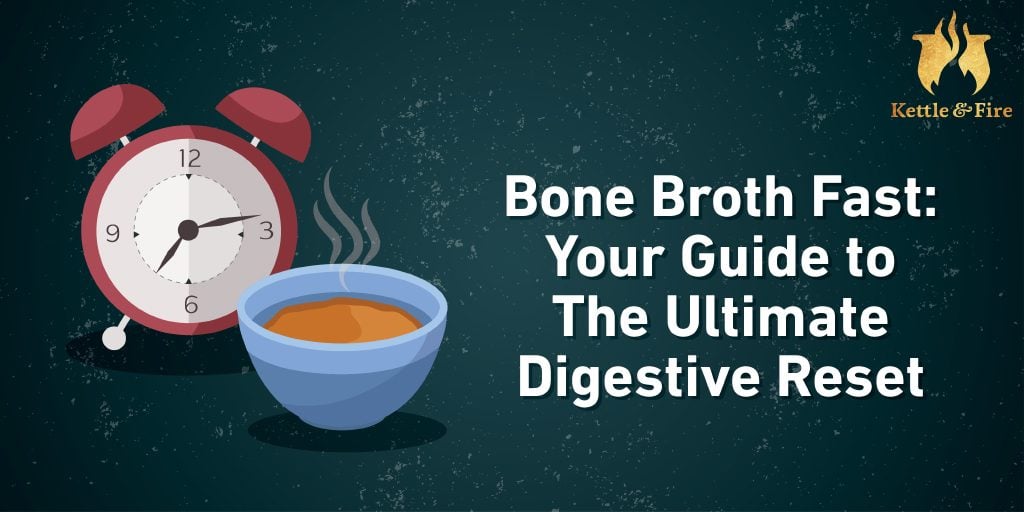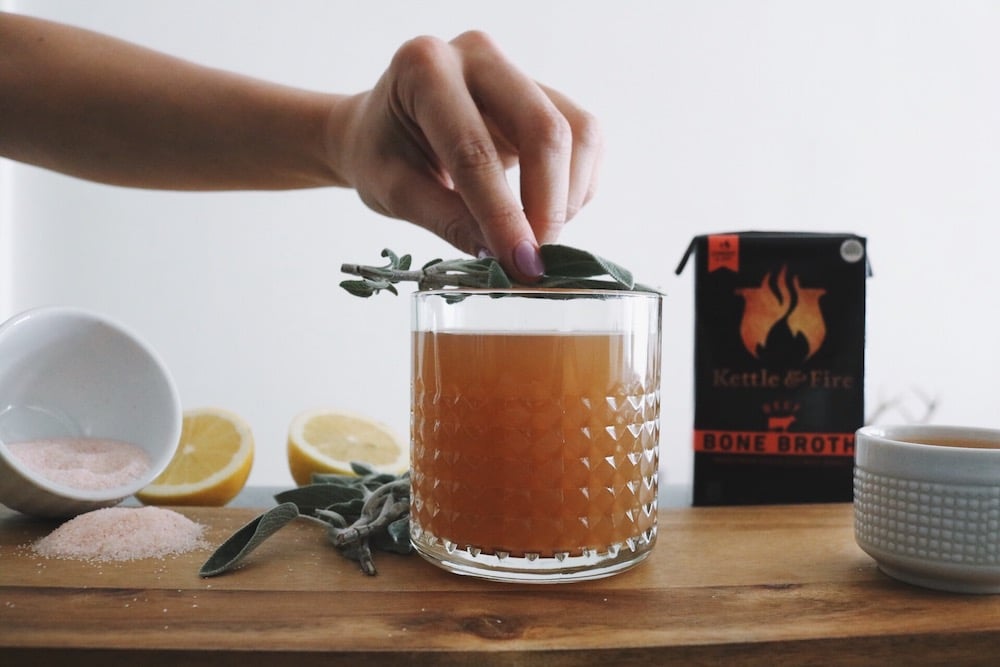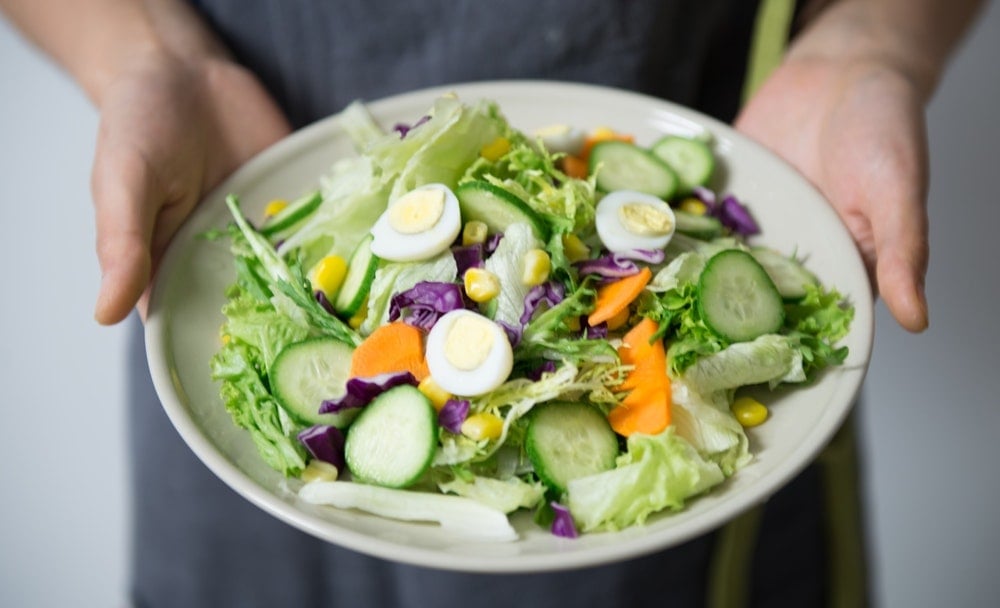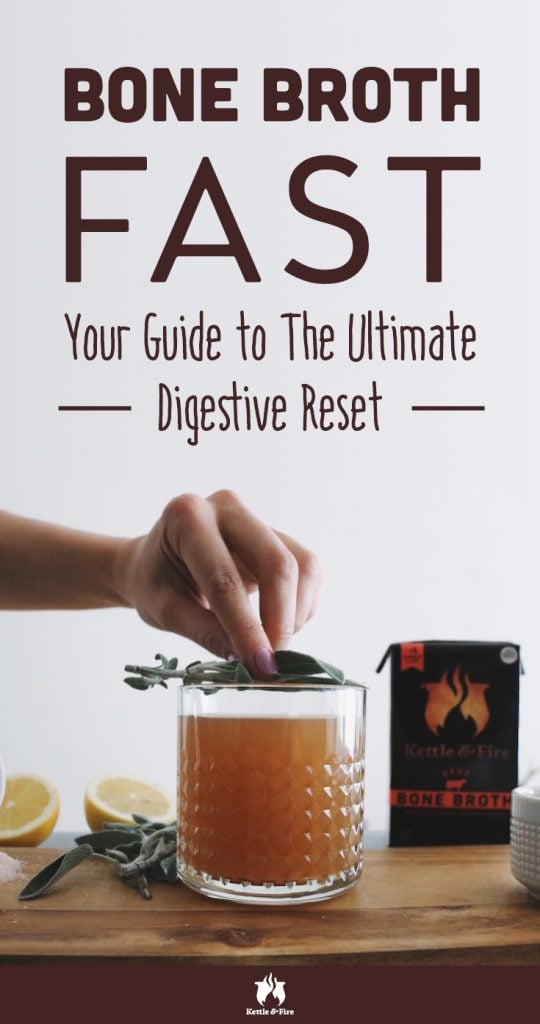Bone Broth Fast: Your Guide to The Ultimate Reset

The nutrients found in bone broth can be incredibly beneficial, and consuming it on a regular basis is one of the simplest and least expensive ways to help you feel your best.
Bone broth is a natural source of nutrients like collagen, gelatin, several trace minerals, and anti-inflammatory amino acids, which support gut, skin, and joint health.
With all these powerful benefits, you can see how drinking bone broth on a regular basis may have a huge impact on the way you feel. But have you ever considered doing a bone broth fast?
What is a Bone Broth Fast?

A bone broth fast combines the benefits of short-term or intermittent fasting with those of drinking bone broth.
Similar to a water fast, a bone broth fast involves taking a break from solid foods and consuming liquids throughout the day. But during a bone broth fast, instead of drinking only herbal tea and water, you drink several cups of bone broth throughout the day (anywhere from five to eight cups).
If you practice intermittent fasting, you can increase your intake of bone broth during your fasting window—which could be anywhere from 12 to 24 hours—and stick to your usual diet during your designated eating window.
One of the key benefits of a bone broth fast (over a dry fast or water fast) is that it allows you to consistently take in plenty of essential nutrients, electrolytes, and protein. This prevents you from becoming dehydrated and helps keep your energy levels up, while the protein from the collagen and gelatin keeps your appetite satisfied. And you can probably agree that you’re most likely to stick to a fast when it doesn’t leave you feeling starved, light-headed, or deprived. (In fact, many people report feeling full until lunchtime when they drink bone broth first thing in the morning.)
Let’s take a look at the specific benefits you can expect to experience from bone broth fasting, and how to get the best results.
Benefits of Doing a Bone Broth Fast
Why Should You Fast?
First, let’s talk about the benefits of fasting. Fasting is a great way to give your system a “reset” and help your body’s natural processes work more efficiently—such as energy production, metabolism, and digestive function (see ya later, bloating!).
For most people, during the day, you’re in the “fed” state. This means your body is working hard to digest, absorb, and assimilate all the nutrients from the foods you eat. But when you enter a fasted state—which simply means you’re not taking in any calories—your body can shift gears and use your energy to focus on the functions that are prioritized after digestion, such as burning fat and boosting metabolism (1).
This is why the “fasted” state is often referred to as the “fat-burning” state. And although you might expect to feel tired or weak without eating, many people experience more energy, less brain fog, and improved focus and concentration when they enter the fasted state.
Fasting also gives your digestive system a break, and when you’re not eating inflammatory foods such as refined sugar and carbohydrates, the beneficial bacteria in your digestive system have a chance to rebalance— which is key for avoiding painful digestive symptoms, such as gas, bloating, and irregularity—and more serious GI conditions, such as candida (yeast) overgrowth and gut dysbiosis. This is because sugar and refined carbohydrates feed the bad bacteria in your digestive tract that can wreak havoc on your system when they overpopulate, and there’s a lack of good bacteria to keep them in check (2)(3).
How Bone Broth Can “Supercharge” Your Fast

Bone broth is a great liquid you can drink when you fast. It’s like filling up your gas tank with premium fuel. This is because bone broth is a source of bioavailable nutrition to support your body’s natural healing processes without taking you out of a fasted state. In contrast, you take in very few nutrients on a regular water fast.
As mentioned above, bone broth contains naturally-occurring collagen and gelatin, but animal bones also contain several other compounds and amino acids that support the body, such as glucosamine, chondroitin, hyaluronic acid, proline, and glycine. These nutrients may help:
- Support digestion
- Support joint health
- Support skin health
- Support a healthy immune response
Of course, drinking bone broth at any time (not just when fasting) will offer these benefits. However, when you’re fasting and consuming only bone broth, your body may be able to digest and absorb these nutrients even more efficiently, allowing them to go where they’re needed that much quicker.
How to Do A Bone Broth Fast

To do a bone broth fast, all you need to do is consume five to eight cups of bone broth (in addition to herbal tea and water) during a fasting period of 24 hours. This 24-hour period is long enough to give your digestive system time to reset.
For example, if you’re 150 pounds, you’ll need to drink about six cups of bone broth to meet your daily protein needs. But if you want to drink more than eight cups, that’s okay too.
If you want to continue your bone broth fast beyond 24 hours, we recommend drinking four to six cups of bone broth per day, and eating one Paleo-friendly meal that contains protein and veggies (for example, grilled salmon and asparagus, or a salad with a grilled chicken breast). You can do this for up to two more days, and then go back to your regular eating routine.
Once you’ve completed a bone broth fast, we recommend making bone broth a regular part of your routine by drinking at least one cup per day (and using bone broth in your recipes wherever possible) for ongoing digestive system support.
How to Get the Best Results from a Bone Broth Fast
1. If you’re new to fasting, do a mini-fast first.
- Slow and steady wins the race! If you’re new to fasting, it’s best to start slowly and work your way up to a 24-hour fasting time. For example, before doing a 24-hour bone broth fast, you may want to give the 16/8 intermittent fasting method a try first, which involves eating during an eight hour time frame, and fasting for the other 16 hours.
- For example, you could eat between 9:00 a.m. and 5:00 p.m., and begin your bone broth fast from 5:00 p.m. until the next morning, breaking your fast at 9:00 a.m.
- In any case, it’s important to always listen to your body. If you begin to feel light-headed, dizzy, or faint at any point, don’t push yourself to continue fasting. It’s perfectly normal to feel a bit tired, but you should never feel like you are straining yourself. Some people do really well with fasting right away, and for others, it can take some time to find the fasting “sweet spot”—and that’s perfectly okay.
2. Avoid intense exercise during fasting.
- Stick to light cardio such as jogging, and gentle yoga.
3. Drink bone broth that’s made with quality bones and connective tissue, such as grass-fed beef bones or organic chicken bones.
- Your broth can only be as good as the bones of the animal it came from. For this reason, we recommend only using grass-fed, grass-finished beef bones or organic chicken bones to make your broth, and avoiding bones from factory farmed animals that have been treated with hormones and antibiotics. This will maximize the potential of the broth.
- You can source bones from local farmers and butchers, and most health food stores sell organic and grass-fed, grass-finished bones. If you don’t have time to make your own broth at home or have trouble sourcing quality ingredients, you can always buy some.
We’ve taken care of sourcing the highest quality ingredients and simmering the bones for up to 24 hours to bring you the most wholesome bone broth possible.
4. Follow a nutrient-rich diet prior to doing a bone broth fast.

- Fasting isn’t a replacement for following a beneficial diet. In fact, if you have processed foods, such as refined sugar and carbohydrates, in your diet, you may be better off making dietary changes before jumping into fasting.
- Refined carbs and sugar can cause blood sugar fluctuations and imbalances, and this may leave you more prone to experiencing unpleasant symptoms during fasting, such as lightheadedness and irritability, if you already have a high sugar diet.
- In this case, The Bone Broth Diet may be a better starting point for you. It involves eating plenty of whole, nutrient-dense foods, while also increasing your bone broth intake.
- If you’re interested in learning more, a few of our team members wrote about their personal experiences of following the 21-Day Bone Broth Diet in this blog post right here.
Bone Broth Fast FAQs
Q: Can I eat anything during a bone broth fast?
A: It’s normal to feel a little bit hungry during a fast, but if you get to the point of being uncomfortable, feel free to add a tablespoon of coconut oil, ghee, or grass-fed butter to your broth, and snack on raw veggies.

Please note that the addition of healthy fats may cause a stomach ache for some people, especially if low stomach acid is an issue.
Q: How often can I do a bone broth fast?
A: If you are in good health, once per week is safe. It’s actually best to do it consistently—every Monday, for example. But if you are doing it this frequently, you need to move to a high-fat, low-carb diet, like the ketogenic diet, for the rest of the week.
This is because if you are eating too many carbs in between fasting days, you will have issues regulating your blood sugar. It’s also extremely important to make sure that you are getting enough vitamins and calories on the non-fasting days, striving for eight servings of veggies.
Q: What is the longest period of time I can fast for?
A: There are mixed opinions from health experts on how long a bone broth fast should last. Some say up to four days. However, we recommend going no longer than 24 hours without solid food. As mentioned above, if you want to continue your fast for a few more days, you can do so for up to two more days after your 24-hour fast, as long as you also include one meal with protein and veggies.
In any case, it’s still important to check with your healthcare practitioner before doing any type of fast to make sure it’s 100% safe for you.
Q: Can I add anything to my bone broth, or do I have to drink it plain?
A: Sipping on bone broth doesn’t have to be boring. In fact, there are ways to make it taste amazing and boost the benefits even more by adding spices like ginger, turmeric, and cayenne.

If you haven’t already downloaded our free Bone Broth Sipping Guide, we’ve got tons of recipes and flavor combinations for you to check out (but please note that any of the recipes that contain almond milk are not for periods of fasting).
Q: Can I use regular stock or broth instead of bone broth?
A: No. A bone broth fast is so beneficial primarily because of the amazing benefits of collagen and gelatin—which are the result of simmering bones and tissue for approximately 24 hours.
A regular stock or broth may not be simmered with bones at all, and even if it is, it will have a far shorter simmer time, which doesn’t allow for enough collagen to be extracted from the bones.
Q: Who should not do a bone broth fast?
A: Do not do a bone broth fast if:
- You’re already underweight
- You’re pregnant or nursing
- You’re planning to become pregnant
- You have a history of disordered eating
- You’re doing intense physical activity
- You’re under intense periods of stress
- You’ve been diagnosed with a heart condition
- You have a blood sugar imbalance (such as hypoglycemia or diabetes) and feel faint when you don’t eat
Q: Can I drink coffee during a bone broth fast?
A: No. And don’t worry: the bioavailable minerals in bone broth can give you energy that lasts longer than the “false” sense of energy caffeine gives you, anyway! Caffeine also triggers spikes and crashes in blood sugar levels, which can lead to irritability and more intense hunger a few hours later.


